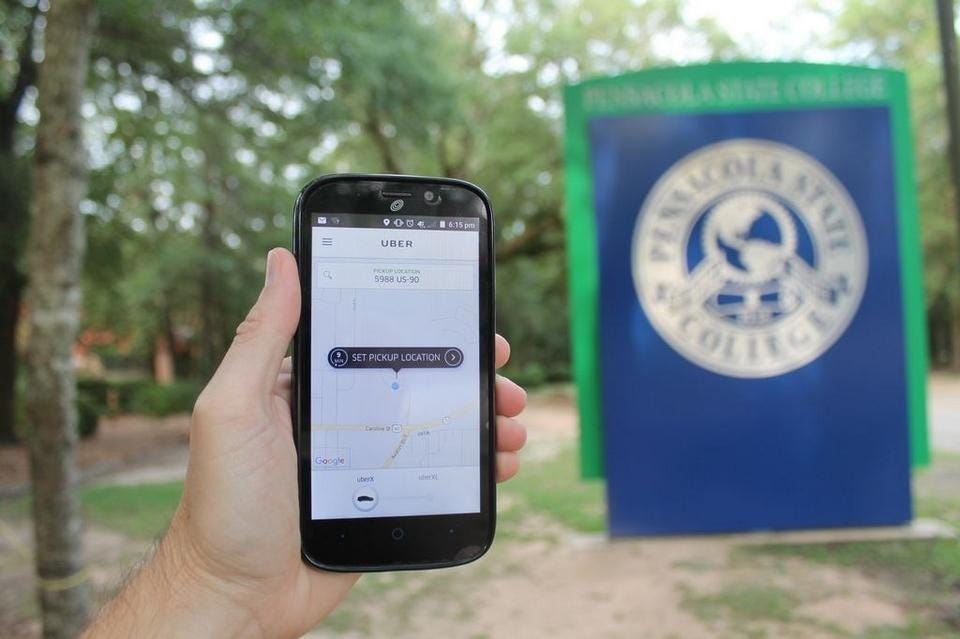![Milton city staffers are exploring using the Uber app as a means to get students without transportation to college and vocational campuses. But subsidizing the program won't help if no local drivers sign up for the service. [File photo]](http://127.0.0.1/wordpress/wp-content/uploads/2022/01/ghows-DA-4bcff092-1926-432f-e053-0100007fb917-9cd178b0.jpeg)
MILTON — City officials for months have discussed ways to help secondary education students without transportation get to local campuses.
Some students enrolled at institutions, such as Pensacola State College or Locklin Technical Institute, lack a reliable way to travel there.
For its part, the Milton City Council is considering subsidizing Uber rides to reduce students’ costs, according to Milton assistant planner Stephen Schoen.
But challenges lie ahead.
TOO FEW DRIVERS
Uber is an app that allows users without cars to order rides from nearby, vetted drivers.
The service could be an opportunity for people to make money while also helping others, according to Randy Jorgenson, the city’s planning director.
Area drivers could include those who have lost a job and need supplemental income, retired residents who want part-time work, or students with transportation.
Milton’s lead committee will meet in late April to decide on the subsidizing initiative.
Jorgenson has urged residents to sign up with Uber; however, too few area drivers have registered for the service.
That’s not necessarily for lack of trying.
RULES OF THE ROAD
Some residents, like Julianne Sawinski-Grant, want to aid the Milton effort, but they can’t.
“I tried to sign up as an Uber driver for the scholarship program, but my truck is too old,” Sawinski-Grant said.
Each type of Uber service has its set of requirements. For instance, drivers must be 21 years of age or older, have three years’ driving experience, an in-state driver’s license, a clean driving record, pass a background check, have in-state plates, current car registration and lack marked, taxi or salvaged vehicles.
UberX, the basic Uber service, accepts any four-door sedan that seats four or more passengers, excluding the driver. However, vehicles must be a 2002 or newer model. In some cities, including New York City or Pittsburgh, guidelines require at least 2006 models.
UberBLACK, the professional service, accepts just eight vehicles. They must be 2013 or newer four-door sedans, crossover SUVs or full-size SUVs in great condition, with black exterior and interior, and comfortably seat four or more, according to the service’s website.
Even with the basic service, prospective drivers may be ineligible due to their car’s age. That was the case for Sawinski-Grant, who said she now faces another problem: too many texts.
“Now Uber texts me 10 times a day, using up my minutes and draining my battery,” she said.
Sawinski-Grant said she told everyone she could about Milton’s program, and hopes it helps students obtain rides. “But I don’t want Uber calling me all the time,” she said.
Eva Behrend, who works in Uber’s Public Affairs and Communications department, said members can simply "text 'STOP' to stop receiving messages."
NEW STATE MANDATE
Florida Senate Committee members on Judiciary in Tallahassee unanimously voted Tuesday in favor of Senate Bill 340.
The measure establishes regulatory framework for operation of transportation network companies, or TNCs, in Florida, according to a press release.
For instance, the bill requires TNCs to carry automobile liability insurance of at least $1 million for death, bodily injury and property damage during a prearranged ride.
“(The vote) is a positive indication that Florida lawmakers support the safety, economic and mobility benefits that come from ridesharing services like Uber,” Stephanie Smith, senior manager of public policy at Uber Technologies, said.
“We are grateful to all of the senators who voted ‘yes’ on the bill, with special thanks to Sen. Jeff Brandes (R-St. Petersburg), who continues to be a champion for modern transportation options.”
Uber has been in Florida for three years, and the state is now one of 36 to pass regulations for ridesharing services.
This article originally appeared on Santa Rosa Press Gazette: THE DILEMMA: Transporting students to college
